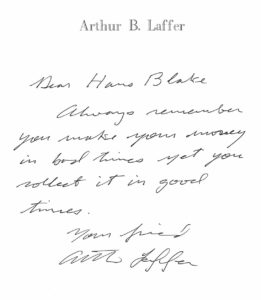On June 19, 2019, President Donald J. Trump awarded the Presidential Medal of Freedom to Arthur B. Laffer. This prestigious award is the highest civilian honor, which may be awarded by the President to individuals who have made especially meritorious contributions to the security or national interests of the United States, to world peace, or to cultural or other significant public or private endeavors.
Who is Arthur Laffer?
Arthur (Art) Laffer is an American economist and author who first gained prominence during the Reagan administration as a member of Reagan’s Economic Policy Advisory Board (1981–89). Ronald Reagan was thought to have based his 1981 economic plan on the idea that cuts in marginal tax rates would increase tax revenues. Laffer is best known for the Laffer curve, an illustration of the concept that there exists some tax rate between 0% and 100% that will result in maximum tax revenue for the government. He attracted attention for his supply-side economic theories, which held that reductions in federal taxes on businesses and individuals would lead to increased economic growth and in the long run to increased government revenue.
History of the Laffer Curve
On December 4, Dick Cheney and a young economist named Art Laffer sat at a booth in the iconic Hotel Washington—the same hotel that appeared in scenes from the Godfather II just months earlier. Cheney was U.S. president Gerald Ford’s deputy Chief of Staff and his boss, Donald Rumsfeld, were looking for alternatives to Ford’s plan to raise taxes. According to Laffer, raising taxes was a bad idea. Instead, if Ford really wanted to encourage economic growth, and therefore government revenue, he should consider cutting tax rates.
Laffer drew the famous Laffer curve on a napkin, which showed that starting from a zero tax rate, increases in tax rates will increase the government’s tax revenue but at some point when the rates become high enough, further increases in tax rates will decrease revenue. This occurs because higher tax rates become strong disincentives against earning (and/or declaring) taxable income. Cuts in marginal tax rates could, therefore, increase tax revenues.
Controversial Economist
My Note from Art Laffer
“Always remember you make your money in bad times, yet you collect it in good times. Your friend, Arthur Laffer”





